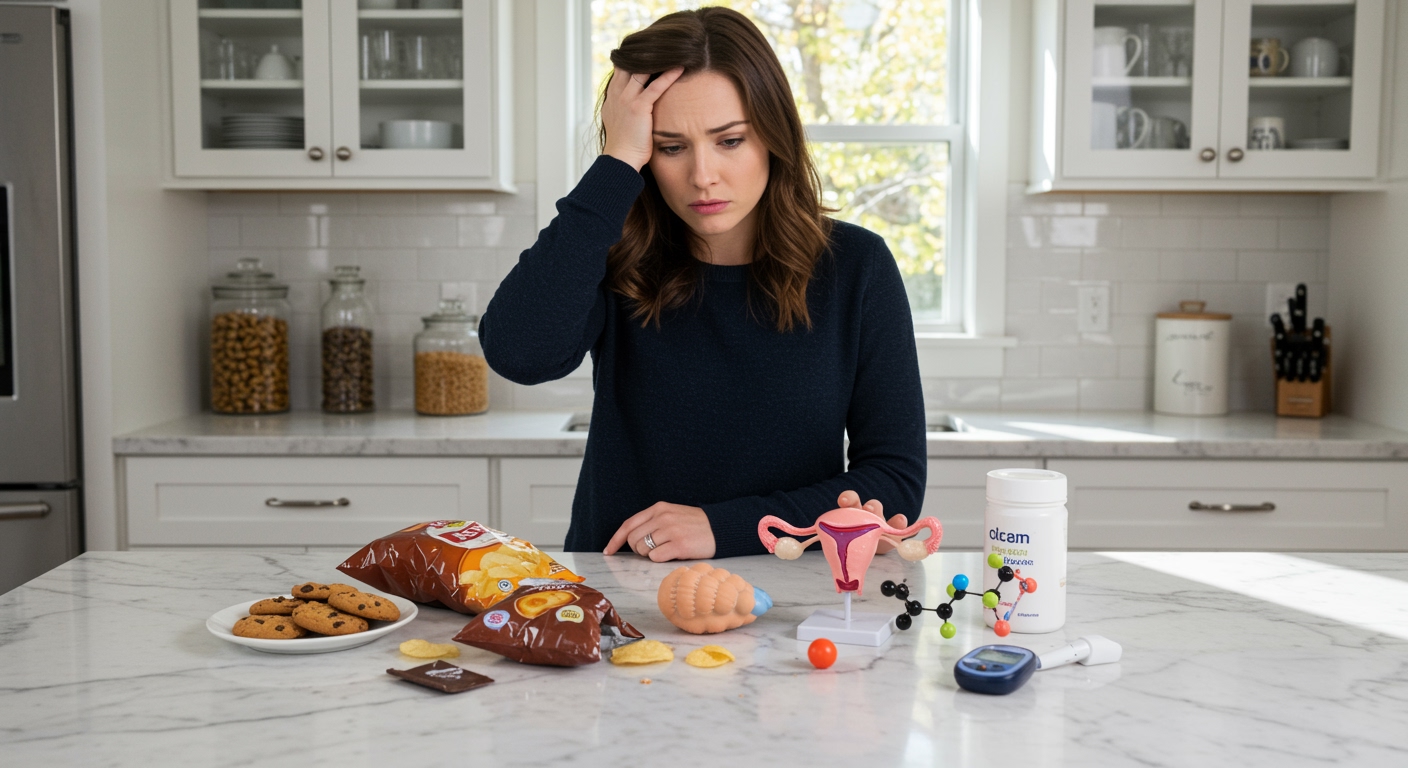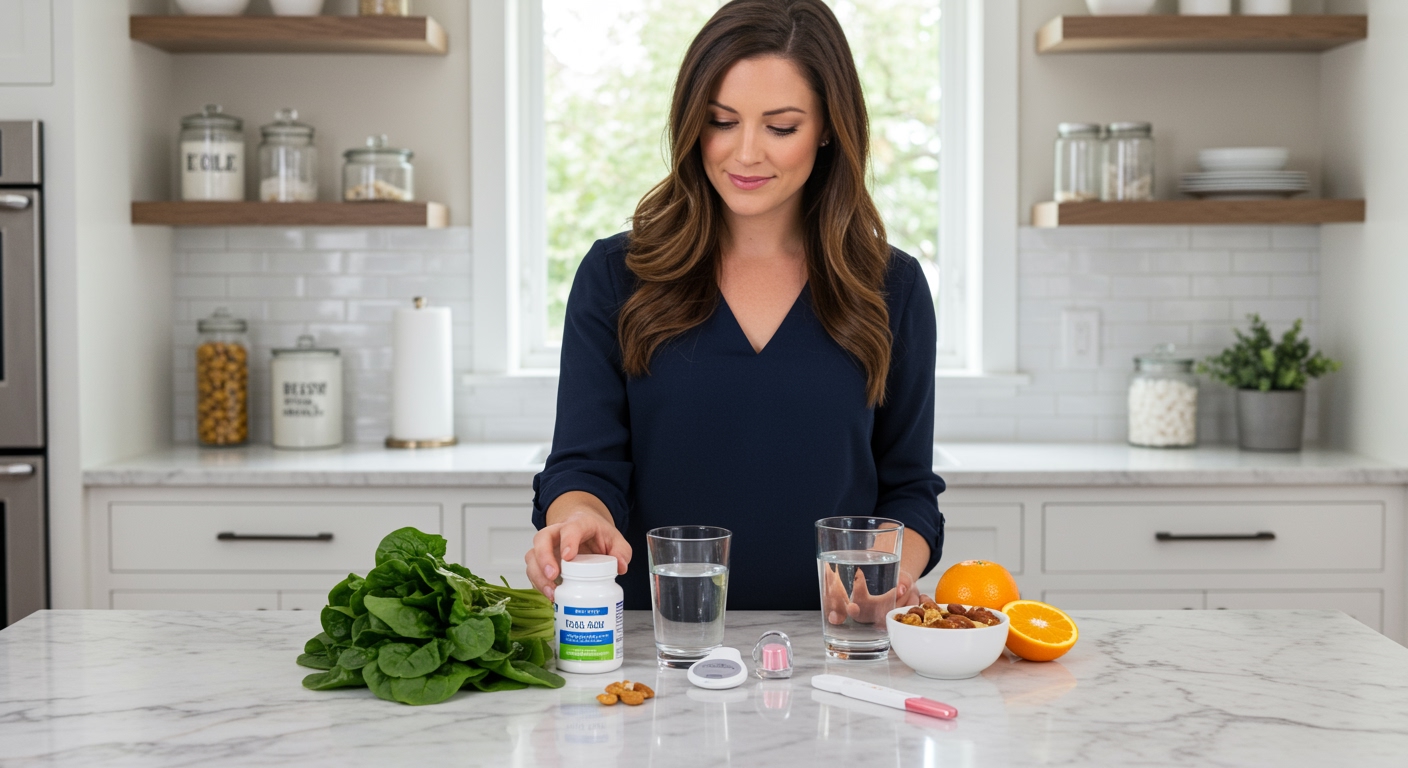✪ Key Takeaway: Stress eating creates a vicious cycle that worsens PCOS symptoms by increasing cortisol, disrupting insulin, and fueling inflammation.
Introduction
You grab that bag of chips after a stressful day, thinking it will help you feel better.
But what if I told you that this innocent stress eating habit might be making your PCOS symptoms significantly worse?
Hi, I’m Abdur, your nutrition coach, and today I’m going to explain exactly how stress eating creates a dangerous cycle that can sabotage your PCOS management efforts.
What Happens In Your Body During Stress Eating?
When you feel stressed, your body releases cortisol, a hormone designed to help you handle emergencies.
This cortisol surge triggers intense cravings for high-calorie, sugary, and fatty foods because your brain thinks you need quick energy.
Your body specifically craves these comfort foods because they temporarily boost serotonin levels, making you feel calmer.
However, this relief is short-lived and comes with serious consequences for women with PCOS.
The combination of elevated cortisol and poor food choices creates a perfect storm that disrupts multiple hormone systems in your body.
✪ Fact: Cortisol levels can remain elevated for hours after a single stressful event, prolonging your food cravings.
How Does Stress Eating Worsen Insulin Resistance?
Stress eating typically involves consuming processed foods high in refined sugars and unhealthy fats.
These foods cause rapid spikes in your blood sugar levels, forcing your pancreas to release large amounts of insulin.
When you already have PCOS, your cells are likely resistant to insulin, meaning they need even more insulin to process the glucose.
This creates a vicious cycle where high insulin levels promote fat storage, particularly around your midsection.
Elevated insulin also signals your ovaries to produce more androgens like testosterone, worsening PCOS symptoms such as acne, hair loss, and irregular periods.
The more you stress eat, the more insulin resistant you become, making weight management increasingly difficult.
✪ Pro Tip: Keep a stress eating journal to identify your specific triggers and patterns before they become automatic habits.
Why Does Stress Eating Increase Inflammation?
The processed foods you typically reach for during stress eating are loaded with inflammatory compounds like trans fats, excess omega-6 oils, and artificial additives.
These foods trigger your immune system to release inflammatory molecules called cytokines throughout your body.
Chronic inflammation interferes with normal hormone production and makes your cells even more resistant to insulin.
This inflammatory state also disrupts your gut microbiome, the collection of beneficial bacteria that help regulate hormones and metabolism.
Women with PCOS already tend to have higher baseline inflammation levels, so stress eating adds fuel to an already burning fire.
The combination of stress hormones and inflammatory foods creates a toxic environment that makes PCOS symptoms progressively worse over time.
✪ Note: Anti-inflammatory foods like fatty fish and leafy greens can help counteract the damage from occasional stress eating episodes.
Can Stress Eating Disrupt Your Sleep And Mood?
Stress eating often happens in the evening when you are winding down from a difficult day.
Consuming high-sugar and high-fat foods close to bedtime can significantly disrupt your sleep quality and duration.
Poor sleep further elevates cortisol levels and reduces your body’s production of growth hormone, which is essential for tissue repair and metabolism.
Sleep deprivation also affects hormones like leptin and ghrelin that control hunger and satiety, making you more likely to overeat the next day.
This creates another layer of the vicious cycle where stress eating leads to poor sleep, which increases stress and triggers more emotional eating.
The mood swings and energy crashes from this cycle can make managing PCOS symptoms feel overwhelming and hopeless.
✪ Pro Tip: Stop eating at least three hours before bedtime to improve sleep quality and break the stress eating cycle.
What Are Better Ways To Handle Stress With PCOS?
The key to breaking the stress eating cycle is finding alternative coping strategies that actually address the root cause of your stress.
Deep breathing exercises, even for just five minutes, can significantly lower cortisol levels and reduce food cravings.
Regular physical activity, particularly strength training and walking, helps your body process stress hormones more efficiently.
When you do feel the urge to stress eat, try drinking a large glass of water first and waiting ten minutes to see if the craving passes.
Keep PCOS-friendly snacks like nuts, seeds, or Greek yogurt easily accessible so you have better options when stress hits.
Building a consistent sleep schedule and practicing stress management techniques will gradually reduce your reliance on food for emotional comfort.
✪ Fact: It takes about 21 days of consistent practice to establish new stress management habits that replace emotional eating patterns.
The Bottom Line
Stress eating absolutely makes PCOS symptoms worse by creating a destructive cycle of hormone disruption, inflammation, and metabolic dysfunction.
Your relationship with food during stressful times determines whether you manage PCOS or let PCOS manage you.
I would love to hear about your experiences with stress eating and PCOS, or any questions you might have about breaking these challenging patterns in the comments below.
References
At NutritionCrown, we use quality and credible sources to ensure our content is accurate and trustworthy. Below are the sources referenced in creating this article:
- PMC: Stress and PCOS: A Systematic Review
- Frontiers in Psychology: PCOS and Psychological Stress
- PMC: PCOS and Metabolic Syndrome
- Medical News Today: PCOS Diet and Nutrition





